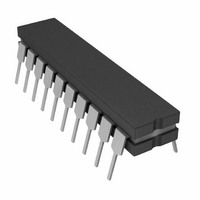AD7528AQ Analog Devices Inc, AD7528AQ Datasheet

AD7528AQ
Specifications of AD7528AQ
Available stocks
Related parts for AD7528AQ
AD7528AQ Summary of contents
Page 1
... AD7528LP – +85 C 1/2 LSB AD7528JR – + LSB AD7528KR – +85 C 1/2 LSB AD7528LR – +85 C 1/2 LSB AD7528AQ – + LSB AD7528BQ – +85 C 1/2 LSB AD7528CQ – +85 C 1/2 LSB AD7528SQ – +125 C 1 LSB AD7528TQ – +125 C 1/2 LSB AD7528UQ – ...
Page 2
AD7528–SPECIFICATIONS Parameter Version 2 STATIC PERFORMANCE Resolution All Relative Accuracy Differential Nonlinearity All Gain Error Gain Temperature Coefficient Gain/ Temperature All ...
Page 3
Parameter Version CHANNEL-TO-CHANNEL ISOLATION OUT B All REF OUT A REF DIGITAL CROSSTALK All HARMONIC DISTORTlON All NOTES 1 Temperature Ranges are Versions: – + ...
Page 4
AD7528 INTERFACE LOGIC INFORMATION DAC Selection: Both DAC latches share a common 8-bit input port. The con- trol input DAC A/DAC B selects which DAC can accept data from the input port. Mode Selection: Inputs CS and WR control the ...
Page 5
V DD DB0 DATA INPUT LATCH INPUTS BUFFER DB7 AD7528 DAC A/ DAC B CONTROL CS LOGIC WR LATCH DGND NOTES: 1 R1, R2 AND R3, R4 USED ONLY IF GAIN ADJUSTMENT IS REQUIRED. SEE TABLE III FOR RECOMMENDED VALUES. ...
Page 6
AD7528 APPLICATIONS INFORMATION Application Hints To ensure system performance consistent with AD7528 specifi- cations, careful attention must be given to the following points: 1. GENERAL GROUND MANAGEMENT transient voltages between the AD7528 AGND and DGND can cause noise ...
Page 7
MICROPROCESSOR INTERFACE A0–A15 ADDRESS BUS A** ADDRESS V DECODE MA LOGIC CPU A + 1** 6800 2 D0–D7 DATA BUS *ANALOG CIRCUITRY HAS BEEN OMITTED FOR CLARITY **A = DECODED 7528 ADDR DAC DECODED 7528 ...
Page 8
AD7528 DIGITALLY CONTROLLED DUAL TELEPHONE ATTENUATOR In this configuration the AD7528 functions as a 2-channel digi- tally controlled attenuator. Ideal for stereo audio and telephone signal level control applications. Table IV gives input codes vs. attenuation for ...










